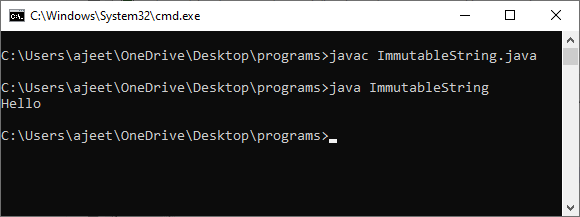Why Are Strings Immutable in Java? Trick Factors and Advantages Discussed
Why Are Strings Immutable in Java? Trick Factors and Advantages Discussed
Blog Article
The Evolution of Unalterable String Handling: An Important Aspect of Software Program Growth
In the detailed realm of software program advancement, the handling of immutable strings stands as a keystone that has undertaken substantial development gradually. From its modest origins to the facility tests come across in very early applications, the trip of unalterable string control has been an important aspect of software application engineering. As we navigate with the historic landscape of this basic idea, tracing the improvements, safety and security ramifications, and arising trends, we discover ourselves at a time where the inherent worth of recognizing this evolution ends up being increasingly evident.
Beginnings of Immutable Strings
When developers sought to enhance the integrity and protection of information dealing with systems,The idea of immutable strings traces back to the early days of shows languages. Unalterable strings refer to strings that can not be changed after they are created. This fundamental concept was introduced to address concerns regarding information stability and avoid unintentional modifications to crucial information saved as strings.

Additionally, immutable strings add to enhancing the overall safety and security of software systems (Why are strings immutable in Java?). By preventing unapproved parties from damaging delicate string data, immutable strings help alleviate the danger of data violations and unapproved access to secret information. This foundational principle proceeds to play a crucial duty in contemporary programming languages and continues to be a keystone of robust and safe and secure software application advancement techniques
Early Challenges and Solutions
One of the main difficulties in handling immutable strings was handling memory successfully. In addition, ensuring that strings stayed unchanged confirmed to be complex, particularly when numerous components of the codebase required to access and customize information.
To resolve these obstacles, programmers started executing data file encryption techniques to secure delicate details stored in unalterable strings. Encryption assisted secure information from unapproved accessibility and adjustment. Moreover, the intro of hashing formulas gave a method to validate the integrity of immutable strings by generating distinct checksums based on their components. If any kind of adjustments had actually happened, these checksums permitted for fast contrasts to determine. By integrating file encryption and hashing techniques into the handling of immutable strings, developers dramatically enhanced the safety and dependability of data within software systems.

Improvements in String Immutability
In software program advancement, a significant development in the handling of immutable strings has arised through improvements in data file encryption and hashing strategies. By utilizing safe and secure hash formulas like SHA-256 or cryptographic techniques such as AES encryption, developers can ensure that delicate information saved in unalterable strings stays tamper-proof and secure. These advancements have bolstered the honesty and privacy of data within applications, specifically in markets where data safety and security is vital, such as cybersecurity, finance, and medical care.
Additionally, advancements in string immutability have actually paved the means for improved efficiency optimization. Immutable strings permit more efficient memory administration and caching strategies, lowering the overhead connected with frequent string controls (Why are strings immutable in Java?). This optimization not only boosts the overall responsiveness of software program applications but likewise contributes to better scalability and resource application
Safety Effects and Finest Practices
With the structure laid by innovations in string immutability, recognizing the security ramifications and implementing best methods comes to be extremely important in safeguarding sensitive information within software applications. Immutable strings play a critical function in boosting security by avoiding unapproved alterations to data, guaranteeing information stability throughout the application's lifecycle. By making use of unalterable strings, developers can reduce typical susceptabilities such as shot assaults, barrier overflows, and information meddling, which are often exploited by harmful actors to compromise systems.
This includes securing data at remainder and in transit, applying appropriate access controls, using safe coding practices, and regularly upgrading software program elements to spot recognized vulnerabilities. By integrating these security procedures and best useful site techniques into software site link program advancement procedures, companies can much better safeguard their information assets and decrease the risk of protection breaches and information leaks.
Future Fads in String Handling
Amidst the ever-evolving landscape of software application growth, the trajectory of string handling is positioned to witness significant advancements and developments. Designers are checking out brand-new formulas and information structures to enhance the speed and effectiveness of string procedures.
In addition, an additional trend imminent is the integration of expert system (AI) and machine learning (ML) in string dealing with tasks. AI-powered tools are being developed to automate and improve various string control procedures, bring about raised performance and precision in software program development operations.
Additionally, there is an expanding focus on improving the protection aspects of string dealing with through advanced encryption methods and protected coding methods. As cyber threats remain to advance, making sure the integrity and confidentiality of information within strings is becoming a leading concern for designers. By taking on durable security measures, such as file encryption at remainder and en route, developers can mitigate the dangers linked with string control vulnerabilities.
Conclusion
To conclude, More Info the development of immutable string handling has actually been a vital facet of software application development, beginning with its origins to the advancements made in the last few years. Early challenges have been resolved with innovative options, resulting in better safety practices in taking care of strings. It is necessary for developers to remain upgraded on the most recent trends in string immutability to make sure the robustness and safety and security of their software application applications.
Unalterable strings refer to strings that can not be changed after they are produced. Why are strings immutable in Java?. By preventing unapproved events from tampering with delicate string information, unalterable strings assist mitigate the threat of data violations and unapproved access to private information. By incorporating file encryption and hashing approaches into the handling of immutable strings, programmers dramatically boosted the security and dependability of information within software program systems
Immutable strings allow for a lot more effective memory administration and caching approaches, reducing the overhead connected with regular string adjustments. Unalterable strings play an important function in boosting protection by protecting against unapproved modifications to data, making sure data integrity throughout the application's lifecycle.
Report this page